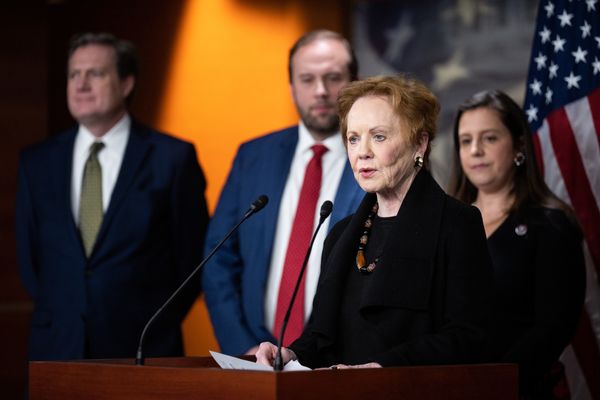WASHINGTON — The House passed a stopgap measure Wednesday to give Congress an extra week to complete an overdue omnibus spending package.
The short-term continuing resolution, which passed on a mostly party-line vote of 224-201, would give lawmakers until Dec. 23 to complete final fiscal 2023 appropriations, brushing up against Christmas Eve for a final omnibus vote. Nine Republicans, most of whom are retiring or lost their seats in the midterm elections, joined all Democrats to support the measure.
Current stopgap funding is set to expire at midnight Friday, risking a partial government shutdown if the new CR doesn’t become law.
Even a simple one-week extension came with a fight, however. House Republicans have mobilized against the stopgap bill because they oppose the omnibus deal reached by Democrats and Senate Republicans. Conservatives are pushing to punt spending decisions into early next year, when Republicans will take control of the House and gain more leverage.
“We should be passing a continuing resolution into next year instead of buying more time to rush through a massive spending package,” said Texas Rep. Kay Granger, the ranking Republican on the House Appropriations Committee, during floor debate.
Appropriations Chair Rosa DeLauro, D-Conn., said Republicans have only themselves to blame for a delayed omnibus and the need for another continuing resolution. She said her GOP counterparts refused to negotiate for months, citing the midterm elections, leadership elections and a special Georgia runoff race.
“They were invited to the table many, many times to join the negotiations,” DeLauro said during floor debate. “They decided not to do that. So we find ourselves here.”
Senate Majority Leader Charles E. Schumer, D-N.Y., said Wednesday he hopes the Senate will take up the House-passed CR as early as Thursday to ensure there would be no partial government shutdown.
But it was unclear whether any GOP conservative senators want to hold things up as a protest. The Senate needs unanimous consent to speed the measure along, so any single senator could gum up the works.
Schumer said the Senate must “pass a one-week CR quickly without the unwelcome brouhaha that has provoked shutdowns in the past. And remember, as we go through this appropriations process, the experiences of the last decades show that those who risked shutdowns in order to make political points always lose in the end.”
Senate Minority Leader Mitch McConnell, R-Ky., expressed no opposition Wednesday to a one-week CR, but he warned that the Senate faces a “challenging sprint” to complete an omnibus bill by his self-imposed deadline of Dec. 22.
“If a truly bipartisan, full-year bill without poison pills is ready for final Senate passage by late next week, then I’ll support it, for our armed forces particularly,” McConnell said on the floor. “Otherwise, we’ll be passing a short-term continuing resolution into the new year.”
Procedural maneuvering
In another effort to speed up the process, the House sent to the Senate an unrelated shell bill that would be used as a vehicle to carry the massive omnibus. The shell bill was sent automatically when the House adopted a rule for floor debate on the CR on a party-line vote of 216-206.
The underlying contents of both measures had previously passed both chambers with tweaks that required further House action. That made them convenient vehicles, especially since the procedure enables the Senate to bring up the measure for consideration without debate — meaning that chamber can skip a cloture vote on the motion to proceed.
Republicans blasted the convoluted maneuver as stifling input from the minority during debate on the rule.
Rep. Chip Roy, R-Texas, called Wednesday’s floor process a “gateway drug” to next week’s omnibus package, a “fraud” and an “end-run” around the rules in order to jam through a nearly $1.7 trillion spending package.
“If all 435 of us stood on the steps of the Capitol with our middle finger to the American people, it would be a more honest action than what we’re engaging in here on the floor of the people’s House right now,” Roy said, invoking a 1969 photo of Johnny Cash flipping the bird to the warden at San Quentin State Prison.
Rep. Mark DeSaulnier, D-Calif., defended the process as needed simply to keep the government up and running.
“What we’re doing today is keeping the lights on,” he said. “With all due respect, the last time the Republicans were in charge of the Congress, the lights went off,” referring to a 35-day shutdown under former President Donald Trump.
Framework spending deal
A path was cleared for an omnibus Tuesday night, when three of the top four appropriators announced agreement on a “framework” for a bill covering appropriations for the fiscal year that began Oct. 1.
While details of the deal were kept under wraps, McConnell appeared to claim a Republican victory by suggesting Democrats had caved in their demand for higher nondefense spending than the GOP would prefer.
“I’m glad that our Democratic colleagues finally accepted the reality and conceded to the Republican position that we need to prioritize our national security,” McConnell said. “Republicans simply were not going to lavish extra liberal spending on the commander in chief’s own party as reward for adequately funding our national defense. It simply wasn’t going to happen.”
Schumer said an omnibus will contain “wins for both sides that both sides want to see, like the Electoral Count Act and funding for our friends in Ukraine.”
The Biden administration has requested $37.7 billion in additional aid for Ukraine in its defense against Russia. And Schumer has said the omnibus would include a measure to clarify the counting of Electoral College votes that Trump sought to use to disrupt the peaceful transfer of power.
The original contents of the omnibus shell bill the House passed Wednesday upon adoption of the rule for the CR are now included separately in the defense authorization bill that the Senate is aiming to clear this week.
The House Rules panel stripped out that unrelated measure from the shell bill text and replaced it with placeholder language: the House-passed Agriculture spending bill and a separate tax provision that passed the House previously as part of a bill that eventually instead became the vehicle for the semiconductor manufacturing incentives law enacted this summer.
Those items make the shell bill germane in the Senate to add the fiscal 2023 omnibus and any tax provisions negotiators can agree to.
Lindsey McPherson contributed to this report.










